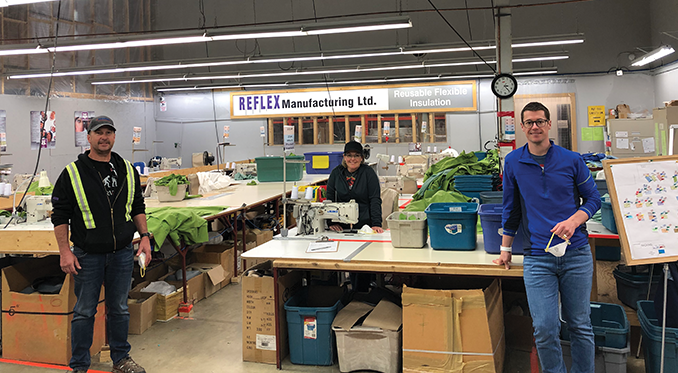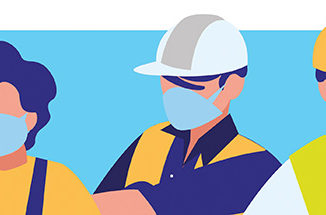
By / Jessica Kirby • Photo courtesy of Reflex Manufacturing
What started off as a relatively optimistic spring quickly turned into unprecedented upheaval as COVID-19 changed the global business and construction landscape. The pandemic was bad for business—irrespective of the industry, layoffs abounded and businesses closed—but some companies that may have suffered pivoted quickly and found new opportunities to keep them afloat. Those that did fared the best and continue to excel as Canada gradually opens up.
Reflex Manufacturing Ltd. (Reflex) in Edmonton, Alberta, is an example of a company that was able to stay nimble and adapt to the changing times. The company manufactures removable insulation blankets—typically used in applications requiring frequent access, where there is movement, or on complex shapes that preclude the use of hard insulation—across North America. It supplies most major oil and gas construction projects, maintenance operations, and turnaround projects in Alberta and several beyond.
In the eye of COVID-19, when business dropped off, Reflex’s Senior Vice-president Chris Yatscoff reached out for new opportunities through Western Economic Diversification and Alberta Health Services.
“When the call to action came out for all of the various government levels, we reached out and submitted our proposals online to offer our services in terms of sewing virtually anything, whether it was gowns, face masks or other sewn equipment and apparel,” Yatscoff says. “We offered our services, and through a myriad of people, we got in touch with Alberta Health Services (AHS) and learned their highest need was for scrubs.”
Yatscoff and his team were quick to accept the challenge to retool their business to take on the contract, which was a natural fit for a facility with over 50 industrial sewing machines at the ready.
“One of the biggest strengths for us was our organization abilities,” says Jason Meikle, president of Reflex. “Everything we do is custom, so adapting to a new project is well within our wheelhouse.”
Adapting required a great deal of reorganization and retooling of the equipment, and organizing the logistics and workflow required countless hours. However, because of its high capacity, Reflex has been able to conduct its regular business and meet the demands of the contract.
AHS expedited samples to Reflex, and the team explored sourcing the materials to meet the scrubs’ stringent and complex guidelines. They have to be completely reversible—including multiple inside and outside pockets—and have no exposed seams. There are colour requirements, both for identification and for the types of materials, and there are requirements on labelling and material type.
“It is a fairly standard scrubs material, but finding it in a cost-effective manner and making sure it met the proper requirements was difficult,” Yatscoff says. “Everything was in limited supply because of the increased global demand for materials and fabrics used in the medical industry. It was a challenge, but we were able to succeed.”
The team brought in several new attachments for the sewing machines to speed up the fabrication process, and they retooled certain machines dedicated to these tasks.
“We lost track of how many hours it took to develop and implement the optimal production flow,” Meikle says. “It required a lot of work by a lot of experienced staff at our company.”
Being cost-effective in Alberta amid the crisis with fabricating medical apparel has been a challenge for the company, which is primarily cost-competing with items produced from overseas.
“Our shop staff has benefits and living wages, and our shop is COR certified with the Alberta Construction Safety Association,” Yatscoff says. “All of those costs are built into our operations, and so the challenge is trying to be as efficient as possible while competing with overseas markets.”
“We have come away from this wanting to encourage people to buy local,” Meikle says. “For Canada to get through this crisis and the debt that our country is incurring, we need to shift the way we do business and work together as a country.”
He points to the oil export markets and the creation of pipelines as ways the government could consider generating more revenue for Canadian companies.
“Through this process, we discovered several levels of government are scrambling to source materials, and if we had the competencies developed and sustained in Canada we would be better prepared in times of crisis,” Yatscoff says.
Learn more about Reflex at www.reflex.ca ▪



